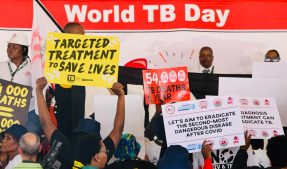Better communication between governments and health practitioners when it comes to issues of treating HIV/AIDS and Tuberculosis, among others, could save more lives. That is the view of Doctors Without Borders’ Dr Shehezady Cruz.
Speaking to the SABC News at offices of the MSF, as the NGO is known, in Beira, Mozambique, Cruz says following the government’s decision to change the HIV drug regime, they noticed a rise in the number of patients showing signs of HIV Drug Resistance.
Dr Shehezady Cruz says after the Mozambican health department introduced a new HIV drug regimen in 2019, this resulted in some HIV drug resistance in about 20% of their patients. #Sabcnews #MSF pic.twitter.com/SDJRcLMLet
— Sipho King K Kekana (@KingKAzania) March 10, 2024
“We realised there was a problem with the medication when we started seeing patients that were not improving with the current medication because they had low CD4 counts, and very high viral loads as well as clinical deterioration and had many opportunistic infections and we knew that they had good adherence (to treatment).”
“And even with this support they continued deteriorating and we saw that there was a need for these genotyping tests to see if these medications were effective and to see what other options (to consider),” adds Cruz.
Since 2014, MSF, has been in Mozambique’s fourth-largest city, assisting the country’s frail health system curb a dual epidemic of HIV and tuberculosis.
According to Doctors Without Borders, Mozambique has one of the highest HIV prevalence rates in the world.
The NGO says around 13% of people aged 15-49 are infected, and 34 000 people co-infected with HIV and TB die each year.
Cruz says the phenomenon picked up following the changing of the drug regime called on them to roll out genotyping – a procedure to test the efficacy of drugs in patients.
She says it was this that allowed them to make the necessary interventions.
“So, these tests, we use can detect some mutations in the gene of HIV cells. If a patient has resistance and they are on this medication, it won’t make any change (to their health). They will have to change to the one that can be effective. So, genotyping is a test that can be done to see the inefficacy of the current treatment and other options that can be used that are limited in our context.”
But all is not lost, as Cruz believes their efforts in dealing with cases of advanced HIV infections, in one of the cities in the southeast African country, are bearing fruit.
In 2014, MSF started working in Beira focusing on advanced HIV and TB in “Key Population” which include sex workers, same-sex relations, transgender people, among others.
It says 34,000 people co-infected with HIV and TB die each year in Mozambique. #SABCNews #MSF pic.twitter.com/WOkhJIiY7c
— Sipho King K Kekana (@KingKAzania) March 10, 2024






